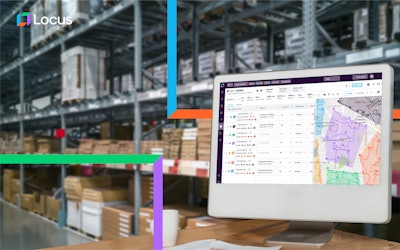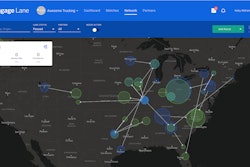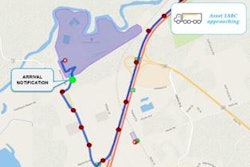
Software company Locus Technologies has been awarded a second patent this year that will benefit last-mile carriers and their drivers, among others.
Locus’ “Machine Learning Models for Predicting Time in Traffic” patent offers logistics providers hyper-accurate estimated travel times, delivering enhanced predictability in their last-mile deliveries by factoring in traffic patterns, which have historically been considered too dynamic to map.
The patent covers unique technology that analyzes the historical data of traffic and predicts the travel time between origin and destination locations. It also factors in sub-variables such as day of the week and time of day.
Locus Founder and CEO Nishith Rastogi said the data will come from diverse sources, including internal, external or a mix of both. The modeling can deliver accurate predictions depending on availability, cost and accessibility, among other factors, he said.
“The more massive the data volumes, the better the traffic predictions,” Rastogi said. “Some businesses that operate on a large scale may prefer to do this modeling on top of their in-house data sets, which they would have derived from their day-to-day operations and fleet management processes. However, others might depend on partners such as us to solve this.
“Take for example, at Locus, one of the features offered as a part of our dispatch management platform is route planning. Our data comes from the executed deliveries, as we have GPS trails of the riders,” he added. “Through our patented technology and a host of other dynamic routing algorithms on this data set, we are able to accurately predict the time taken between point A to point B by accounting for 180+ business and around 250+ hard and soft real-world constraints. This is how we are able to create the most efficient routes for all orders for our clients.”
Accurate prediction of time in traffic is largely a feature delivered by map providers like Google. Such technology giants have control over the Android ecosystem, allowing them to do this at an unimaginable scale.
Rastogi said Locus’ patented technology gives it the competitive advantage to accurately predict time in traffic with limited data available.
Locus Founder and Chief Technology Officer Geet Garg said in a news release that Locus’ goal with for its machine-learning technology is to enable enterprises across industries to drive high-precision logistics operations in any geography, reduce costs and achieve business success.
Rastogi told CCJ that all stakeholders across the last-mile ecosystem, from companies to end-delivery partners or drivers, would benefit from this new patented technology.
“Better traffic predictions would result in more on-time deliveries, which would improve the customer experience and, in turn, result in revenue growth for businesses,” Rastogi said. “Furthermore, this will empower the workforce, i.e., drivers. Accurate estimation of the traffic will help them create optimized routes, helping drivers complete the deliveries faster. This will increase the drivers’ productivity, morale and satisfaction levels,” which ultimately benefits the last-mile carriers for whom they work.
And Locus isn’t stopping at better traffic predictions.
The company launched an initiative in 2018 that provides regular training sessions, end-to-end support for IPR filings and more, to encourage all employees to apply for patents in their own names. The “Machine Learning Models for Predicting Time in Traffic” patent is a result of that program.
This marks the fourth patent Locus has been awarded in four years, and more are in the works.
Rastogi said the company is working on multiple projects with a healthy pipeline from a technology standpoint.
One of those things, he said, is enhancing data quality, which acts as fuel for the prediction algorithm, to further provide hyper-accurate estimated travel times for logistics providers to enable more on-time deliveries.
“We are also constantly finding ways to improve our dynamic algorithm, which powers our dispatch management solution,” he said. “The aim is to improve the quality of data being fed into our systems so that we are able to drive real-world efficiency and enable growth across all fulfillment channels.”











